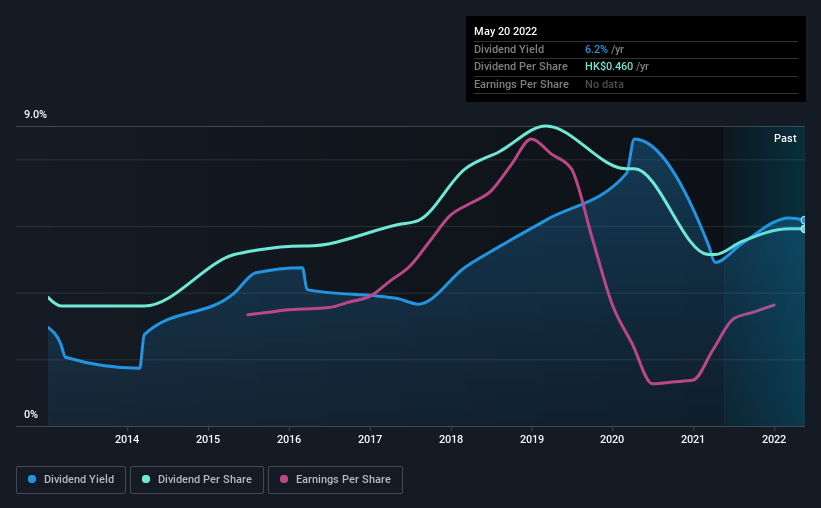- Hong Kong
- /
- Real Estate
- /
- SEHK:194
Liu Chong Hing Investment (HKG:194) Will Pay A Larger Dividend Than Last Year At HK$0.28
Liu Chong Hing Investment Limited's (HKG:194) dividend will be increasing to HK$0.28 on 6th of June. This makes the dividend yield about the same as the industry average at 6.2%.
See our latest analysis for Liu Chong Hing Investment
Liu Chong Hing Investment's Earnings Easily Cover the Distributions
Solid dividend yields are great, but they only really help us if the payment is sustainable. Prior to this announcement, Liu Chong Hing Investment's dividend was only 41% of earnings, however it was paying out 115% of free cash flows. While the company may be more focused on returning cash to shareholders than growing the business at this time, we think that a cash payout ratio this high might expose the dividend to being cut if the business ran into some challenges.
Unless the company can turn things around, EPS could fall by 1.4% over the next year. Assuming the dividend continues along recent trends, we believe the payout ratio could be 42%, which we are pretty comfortable with and we think is feasible on an earnings basis.

Liu Chong Hing Investment's Dividend Has Lacked Consistency
Liu Chong Hing Investment has been paying dividends for a while, but the track record isn't stellar. This makes us cautious about the consistency of the dividend over a full economic cycle. Since 2013, the first annual payment was HK$0.30, compared to the most recent full-year payment of HK$0.46. This implies that the company grew its distributions at a yearly rate of about 4.9% over that duration. Modest growth in the dividend is good to see, but we think this is offset by historical cuts to the payments. It is hard to live on a dividend income if the company's earnings are not consistent.
Liu Chong Hing Investment May Find It Hard To Grow The Dividend
Given that the dividend has been cut in the past, we need to check if earnings are growing and if that might lead to stronger dividends in the future. Unfortunately, Liu Chong Hing Investment's earnings per share has been essentially flat over the past five years, which means the dividend may not be increased each year.
Liu Chong Hing Investment's Dividend Doesn't Look Sustainable
Overall, we always like to see the dividend being raised, but we don't think Liu Chong Hing Investment will make a great income stock. While Liu Chong Hing Investment is earning enough to cover the payments, the cash flows are lacking. Overall, we don't think this company has the makings of a good income stock.
It's important to note that companies having a consistent dividend policy will generate greater investor confidence than those having an erratic one. At the same time, there are other factors our readers should be conscious of before pouring capital into a stock. For example, we've identified 3 warning signs for Liu Chong Hing Investment (1 is a bit unpleasant!) that you should be aware of before investing. Is Liu Chong Hing Investment not quite the opportunity you were looking for? Why not check out our selection of top dividend stocks.
New: AI Stock Screener & Alerts
Our new AI Stock Screener scans the market every day to uncover opportunities.
• Dividend Powerhouses (3%+ Yield)
• Undervalued Small Caps with Insider Buying
• High growth Tech and AI Companies
Or build your own from over 50 metrics.
Have feedback on this article? Concerned about the content? Get in touch with us directly. Alternatively, email editorial-team (at) simplywallst.com.
This article by Simply Wall St is general in nature. We provide commentary based on historical data and analyst forecasts only using an unbiased methodology and our articles are not intended to be financial advice. It does not constitute a recommendation to buy or sell any stock, and does not take account of your objectives, or your financial situation. We aim to bring you long-term focused analysis driven by fundamental data. Note that our analysis may not factor in the latest price-sensitive company announcements or qualitative material. Simply Wall St has no position in any stocks mentioned.
About SEHK:194
Liu Chong Hing Investment
An investment holding company, engages in the investment, development, sale, management, and letting of properties in Hong Kong, the People’s Republic of China, the United Kingdom, and Thailand.
Fair value with mediocre balance sheet.
Market Insights
Community Narratives



